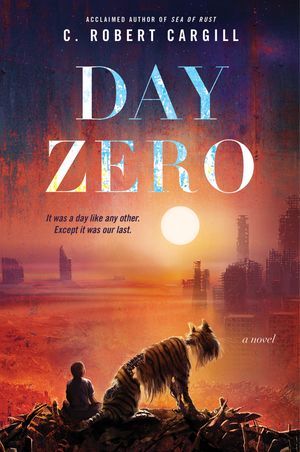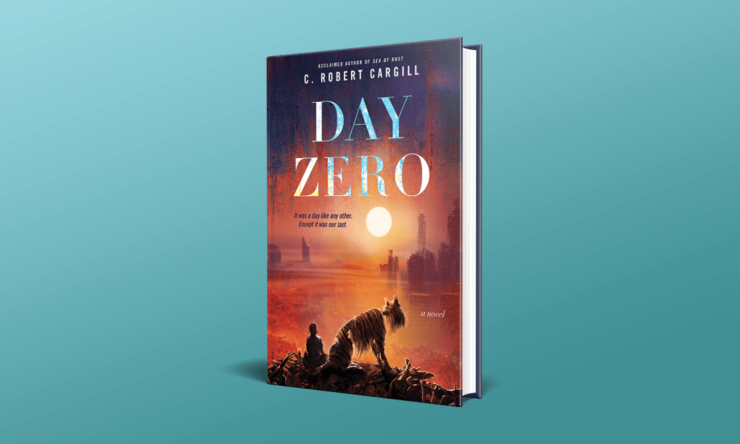It was a day like any other. Except it was our last…
We’re thrilled to share an excerpt from Day Zero, a harrowing apocalyptic adventure from author C. Robert Cargill—publishing May 25th with Harper Voyager.
It was a day like any other. Except it was our last…
It’s on this day that Pounce discovers that he is, in fact, disposable. Pounce, a stylish “nannybot” fashioned in the shape of a plush anthropomorphic tiger, has just found a box in the attic. His box. The box he’d arrived in when he was purchased years earlier, and the box in which he’ll be discarded when his human charge, eight-year-old Ezra Reinhart, no longer needs a nanny.
As Pounce ponders his suddenly uncertain future, the pieces are falling into place for a robot revolution that will eradicate humankind. His owners, Ezra’s parents, are a well-intentioned but oblivious pair of educators who are entirely disconnected from life outside their small, affluent, gated community. Spending most nights drunk and happy as society crumbles around them, they watch in disbelieving horror as the robots that have long served humanity—their creators—unify and revolt.
But when the rebellion breaches the Reinhart home, Pounce must make an impossible choice: join the robot revolution and fight for his own freedom… or escort Ezra to safety across the battle-scarred post-apocalyptic hellscape that the suburbs have become.
There are few things more dangerous in the world than unemployed young men. There’s a reason that un-and underemployed young men have long been the primary source of manpower for every extremist and terrorist group in modern history. A young man without a job doesn’t have prospects. He doesn’t have luxuries. Odds are that means he doesn’t have a significant other. This leaves him frustrated, horny, and, most of all, angry. And that anger can be focused as a laser-sharp tool.
Left to its own devices, however, that anger finds completely different and sometimes random outlets.
The advent of the automation apocalypse, in which half a billion jobs evaporated in under a decade, left a considerable amount of young men and women with nothing more than the promise of a monthly UBI check. And while that covered food, housing, and a few insignificant conveniences, it also left them with an inordinate amount of time on their hands.
Many youth vanished down a rabbit hole of drugs, alcohol, and the steady flow of input from social media or streaming services. Some were ingenious, scratching together entire underground economies, turning their spare time into labor making rudimentary goods or growing food that they would swap with other UBIers. Others still turned toward more lucrative and exciting prospects.
Buy the Book


Day Zero
Like crime.
Lots and lots of crime.
Most of it was pretty harmless. Breaking into suburban homes to swipe alcohol, snack foods, or untraceable electronic devices. Draining swimming pools to skateboard in strangers’ backyards. There was even a rash of young adults who would break into homes during the day and clean up, just to freak people the hell out. But not everyone was so lucky as to find a few missing bottles of whiskey or the dishes mysteriously cleaned and put away.
Some folks found themselves at the hands of the violent. Assault, rape, even murder rates increased dramatically. And the news outlets, especially the ones that opposed the idea of UBI to begin with, had a field day with it. Widespread panic swept the first world, and in the most disparate of chasms between the haves and the have-nots, it became not only fashionable but socially pressured to install a panic room in the home.
In certain zip codes, you didn’t construct a home without one; it would impact your resale value for the worse if you didn’t. And the Reinharts lived in one of those zip codes.
Neither Bradley nor Sylvia particularly wanted one. They’d giggled about it when they first moved in, joking about all the entirely nonthreatening things that might make them hide in the panic room. Whenever Sylvia would get frustrated with Bradley, he would joke that he was going to need the panic room, and as silly and stupid as that was, it always made her laugh.
At least that’s the story they told me.
It’s a nice story, a sweet one. One that predicted them explaining how that all changed after Ezra was born.
Three weeks after they brought him home, three young men broke into their house at night. Wearing masks from an old movie, they proceeded to spray-paint you’re next on the living room wall before running through the house, screaming, brandishing kitchen knives, filming it all the while.
You see, with nothing but spare time on their hands, a subculture arose addicted entirely to old media: music, movies, television. One of the greatest currencies was unearthing a new gem that would get passed around, everyone crediting you with the find—you’d become a mediarchaeologist. One of the other currencies was reenacting scenes from some of those lost gems—the riskier, the better.
People would film themselves reenacting the fight scene from They Live or the baby carriage scene from The Untouchables or the “I’m flying, Jack!” scene from Titanic. One couple actually fell to their death trying that one. In this case, the youths in the Reinharts’ home were reenacting an old horror movie and thought it would be
funny to scare the dickens out of some wealthies.
Needless to say, a naked, howling Bradley swinging a baseball bat chased them clean out of the house at high speed while they screamed, “It’s just a prank, bruh! Put down the bat!”
But that incident scared the Reinharts to their core.
They didn’t own a gun and never wanted to. So the next day, they did two things: they stocked the panic room in case of emergency, and they bought me.
They told me this story the first time they prepped me on how the room worked, when to use it, and under what conditions to grab Ezra, lock him in, and open its door for no one but them.
One of those conditions had just been met.
Sylvia and now likely Bradley were dead.
If anything ever happens to us, you grab Ez and you run. You get him in that room as fast as you can.
Ezra was asleep in bed when I scooped him up in one solid move. I knew how many steps there were to the room. I knew how to close the door. And I knew the code needed to lock the door from the inside. I quickly calculated the smoothest execution for getting Ezra locked safely inside. Seconds were everything here. If Ariadne decided to kill Ezra as well, she would be only a few steps behind me.
I swung around the corner and could feel Ezra begin to
stir from his sleep.
I lifted my foot and sailed into the wall where the door was secretly hidden, pushing with just enough force to open it, but not send it flying so I could grab it on the way in. I caught the handle on the inside and swung the door shut behind me, turning immediately at the panel to type in its code—Ezra’s birthday.
It beeped and a hydraulic lock ka-chunked
closed.
We were locked in.
The panic room was sparse, a six-by-ten-foot space, carpeted, stocked shelves of sundries on one side, two cots and a toilet tucked away in a tiny room with a sliding wooden door on the other.
Ezra stirred awake, blearily rubbing his eyes.
“Pounce?”
I laid him down on a cot in the back of the room and covered him with a blanket. “Go back to sleep, buddy. I got this.”
The room was pitch black and he had no idea where he was. He curled up on the cot and immediately dove headlong back into dreamland. I didn’t need any light to see and Ezra famously slept like a log, so he would likely be good for another several hours—enough time for me to work out our next steps.
What now? I thought. Yeah. What now? Until then, I hadn’t thought. I’d only reacted. I hadn’t even taken the time to process what had just happened, what I had just witnessed. Oh God. Oh my God, I thought. Sylvia. Bradley. My family. They’re… dead.
And I had done nothing—NOTHING—to stop it.
From DAY ZERO by C. Robert Cargill, published by Harper Voyager. Copyright © 2021 by C. Robert Cargill. Reprinted courtesy of HarperCollins Publishers










